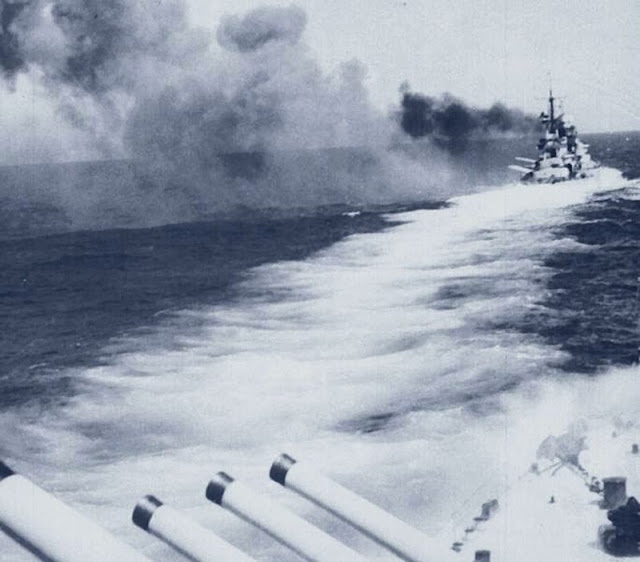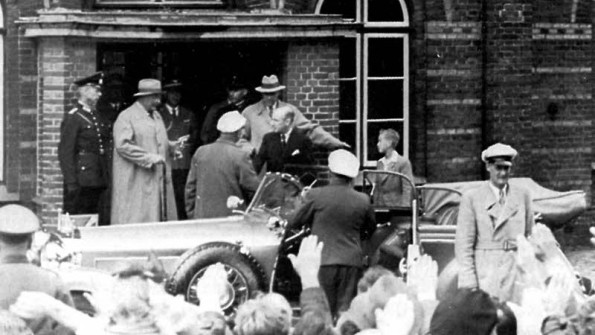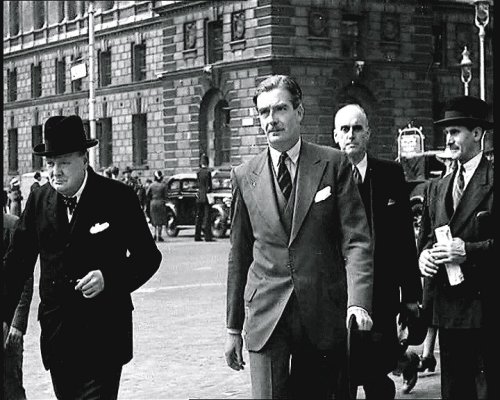Tuesday 9 July 1940
 |
| The Italian Cruiser Zara at the Battle of Calabria, 9 July 1940. |
In the Battle of Calabria aka the Battle of Punta Stilo, the Royal Navy and Italian Fleet square off in the vicinity of the Italian naval base at Taranto. The engagement arises from each side shepherding convoys to North Africa at the same time, the British with Convoy MF 1 from Malta. The British have the advantage of firepower, while the Italians have speed.
At about 15:15, the two sides see each other and their cruisers open fire at extreme long range. The Italians damage cruiser HMS Neptune, causing the British to withdraw. However, battleship HMS Warspite then comes up, and a duel between her and Italian battleships Giulio Cesare and Conte di Cavour begins at 15:52. The artillery duel as noted as one of the longest in naval history, at about 24 km (the Kriegsmarine's Operation Juno on 8 June also was about as far, but that was a heavy cruiser against an aircraft carrier). Giulio Cesare takes a hit which reduces its speed, and the battle turns into a duel between each side's cruisers. The Italian Admiral Campioni withdrew with his battleships to Messina at about 17:00. A final Italian air attack damages several of the Royal Navy capital ships. The cargo ships for both sides ultimately reach their destinations, so it is a strategic draw. Most consider the engagement a slight (and rare) Italian naval victory.
Force H, operating out of Gibraltar, is attacked by bombers but suffers no damage.
At Malta, there is a raid at 08:00 by an SM79 bomber and seven CR42s. They bomb Luga, with the RAF prominent in the defense. The Italians lose two planes. Governor Dobbie requests and receives permission to stop using his limited air resources in offensive operations against Sicily, instead of using them to defend the island only at his discretion.
 |
| Italian battleship Conte di Cavour. Italian battleships were heavily armed but lightly armored, making them fast but vulnerable. |
U-43 torpedoes and sinks 3,944-ton British freighter Aylesbury about 230 miles southwest of Cape Clear, Ireland in the southwest approaches at 21:35. All 35 onboard survive.
U-99 (Otto Kretschmer) completes its 14-hours of depth-charge attack and survives. Kretschmer pretends calmly to read a book throughout the ordeal as if he hasn't a care in the world. The book is upside down. There are 129 depth charges dropped.
British submarine HMS Salmon hits a mine (that is the assumption) and sinks off Egersund, Norway. All 35 aboard perish.
German raider Thor sinks Belgian freighter Bruges in the South Atlantic. The crew becomes prisoners of war.
The Luftwaffe bombs and badly damages sloop Foxglove off the Niab en route to Portsmouth.
The Germans send about 60 Bf 109s and 110s on a sweep across the English channel and find targets in a convoy forming up at the mouth of the Thames River. The Luftwaffe catches British freighters Kenneth Hawksfield and Polgrange in the Dover sector and damages them. The Luftwaffe sinks Latvian freighter Talvaldis off Devon. Dutch steamer Iola also was damaged, along with Greek freighter Aegeon.
German armed merchant raider Komet (Kapitän zur See Robert Eyssen) leaves Bergen to break out into the Pacific via the Northern Passage. Soviet icebreakers assist her. The Komet itself is reinforced to travel through ice.
Convoy SL 39 departs from Freetown.
 |
| The Italian battleship Giulio Cesare firing salvos from her big guns near Punta Stilo during the Battle of Calabria. Ministero Della Difesa-Marina photo. |
RAF Bomber Command raids the key airbase at Stavanger with a dozen planes, Norway, losing seven of the twelve bombers with the rest damaged.
The RAF also sends 11 Hampden bombers to attack the battleship Tirpitz (still under construction) without causing any damage.
King George VI presents Guy Gibson with the DFC on a visit to RAF Digby. Gibson earned this by completing 34 missions in five months with No. 3 Squadron.
The new Luftwaffe night fighter force gets its first victory off Heligoland. Ofw Paul Förster of 8/NJG1 shoots down a Whitney bomber at 02:50. The British crew becomes POWs (this is not the initial night fighter victory of the war, just of this unit).
JG26 adds another Gruppe, 8./JG26, by taking over 2./JG1.
Spitfires of RAF No. 54 Squadron shoot down such an unarmed He-59 marked as a search-and-rescue aircraft on the Goodwin Sands and capture the crew. Nothing incriminating is found and the official report states that "The men were unarmed and whatever else they may or may not have been doing they seem to be genuine sea-rescue Red Cross workers." However, the apparent innocence of the craft does not sway the British, who are deeply suspicious that such planes are performing reconnaissance missions.
 |
| The He-59 forced down at Goodwin Sands on 9 July 1940. |
US Military: US Marine Corps Captain Kenneth W. Benner takes over the military presence on Midway Atoll, relieving Captain Samuel G. Taxis.
British Government: The House of Commons approves a £1,000 Million line of credit for war expenditure.
The crown appoints the Duke of Windsor the Governor of the Bahamas. He is widely viewed as having German sympathies, and this position is more to keep an eye on him than to reward him with new responsibilities. Hog's Island (Nassau) in the Bahamas has several residents who are considered suspicious, such as industrialist Axel Wenner-Grenn of Sweden.
The Admiralty claims credit for sinking the French battleship Richelieu during recent Operation Catapult. The claim technically is correctly, but the Richelieu has settled in very shallow water and is quickly repaired and refloated.
French Government: The French legislature at Vichy votes Marshal Pétain's full powers to establish a new constitution by decree, with only three in the Chamber and one in the Senate voting against him. In this manner, the Third Republic ends.
Pierre Laval, the French vice-PM, announces that the Republic will become "a Fascist form of government, which I have long admired." This is the first time any member of the Vichy government has openly admitted to Fascist leanings. The new national slogan, "Work, Family, and Fatherland," is adopted.
The Armistice Commission announces that all German POWs in French custody have now been released.
German Government: Berlin announces that Romania is under German protection.
Czechoslovakian Government: Edvard Benes forms a government-in-exile in London.
Romania: King Carol II orders the arrest of Marshal Ion Antonescu after Antonescu sends him a note protesting the decision to give the Soviet Union the lands it had demanded in the east. Antonescu is interned at Bistrița Monastery. At this time, Antonescu is viewed with suspicion by just about everyone.
Greenland: U.S. Consul to Greenland James K. Penfield, Governor of North Greenland E. Brun, and a group of Danish officials arrive at Boston on U.S. Coast Guard cutter USCG Campbell for discussions about trade with Greenland.
Iceland: Canadian Z Force arrives to supplement the existing British occupation force (treated as "guests" by the locals).
China: A Japanese embassy spokesman in Shanghai demands an apology for the recent arrest of 16 Japanese Gendarmes by US Marines, threatening that this could affect "the whole course of Japanese - United States relations."
Sweden: The government denies that it is joining the Axis despite allowing the Wehrmacht transit rights.
Norway: It is reported that Vidkun Quisling is now a local radio commentator in Norway. "Quisling" already has become a synonym for "traitor."
Holocaust: Polish Silesian politician Józef Biniszkiewicz perishes at Buchenwald.
British Homefront: War jitters are at a fever pitch. There are so many rumors of parachutists, German ray guns and the like that the government warns that spreading false rumors will be prosecuting.
Edward R. Murrow is broadcasting in dramatic fashion to the States about The Blitz.
American Homefront: President Roosevelt dodges questions at a press conference about whether he will seek an unprecedented third term. He already has decided to do so but wants to maintain the suspense.
The Major League All-Star Game is held in Sportsman's Park in St. Louis, with the National League winning, 4-0.
July 1940
July 1, 1940: Vichy France
July 2, 1940: Arandora Star
July 3, 1940: Operation Catapult at Mers El Kébir
July 4, 1940: Romania In Crisis
July 5, 1940: The Five Freedoms
July 6, 1940: Hitler's High Point
July 7 1940: Dakar And Ringo
July 8, 1940: Tea Rationing in England
July 9, 1940: Battle of Calabria
July 10, 1940: Battle of Britain Begins
July 11, 1940: "Nous, Philippe Petain"
July 12, 1940: Enter Laval
July 13, 1940: German Surface Raiders Attack!
July 14, 1940: Bastille/Mourning Day
July 15, 1940: Tallest Man Dies
July 16, 1940: Plans for Sea Lion
July 17, 1940: Burma Road Closed
July 18, 1940: FDR Runs Again
July 19, 1940: Last Appeal To Reason
July 20, 1940: First Night Fighter Victory
July 21, 1940: Soviets Absorb Baltic States
July 22, 1940: First RAF Night Fighter Victory
July 23, 1940: Invasion False Alarm
July 24, 1940: The Meknés Incident
July 25, 1940: Black Thursday for RAF
July 26, 1940: Capture The Duke?
July 27, 1940: What's Up, Doc?
July 28, 1940: Destroyers Pulled From Dover
July 29, 1940: Barbarossa On The Burner
July 30, 1940: Hitler Delays Sealion
July 31, 1940: Bloody Wednesday of Olkusz
2020





